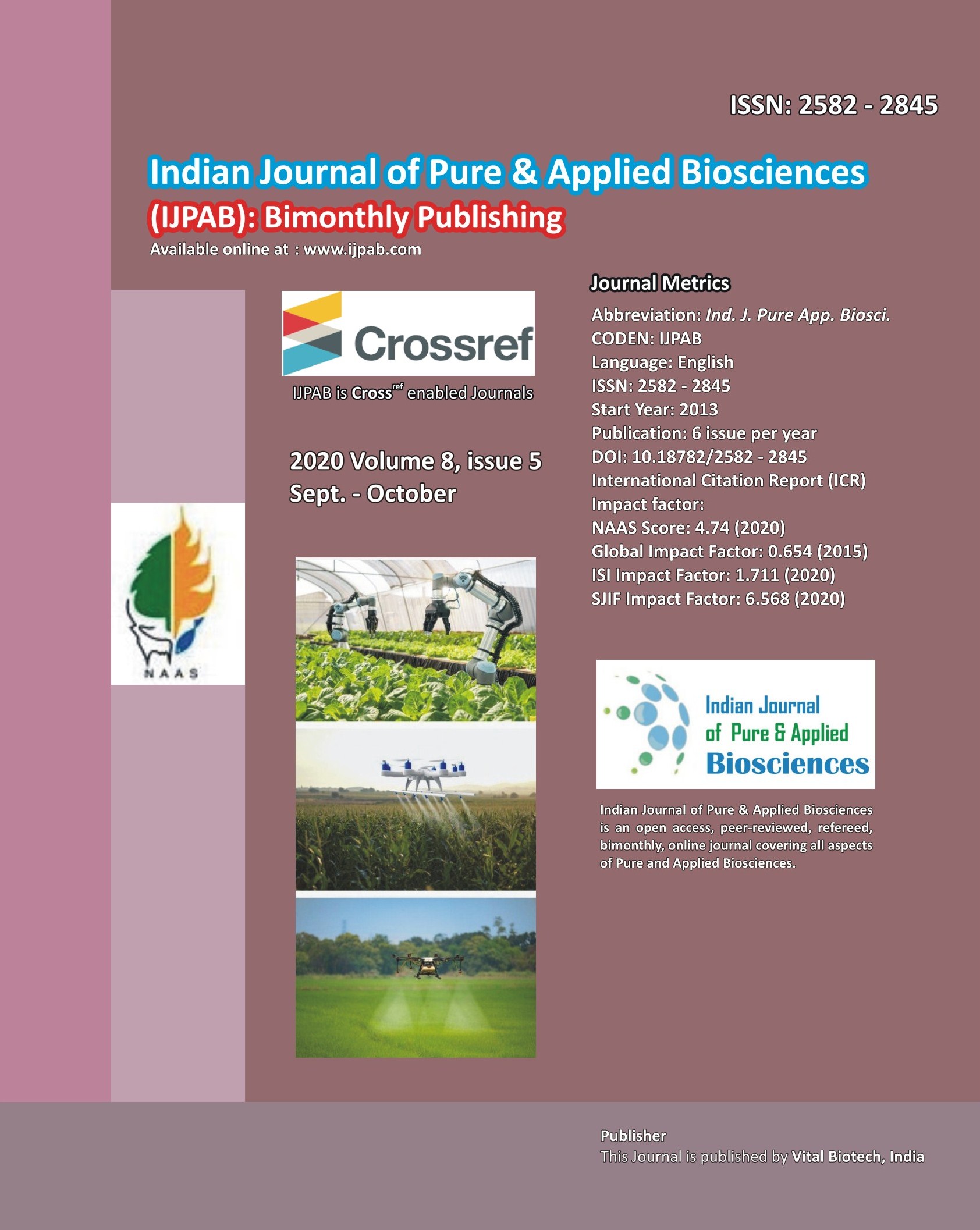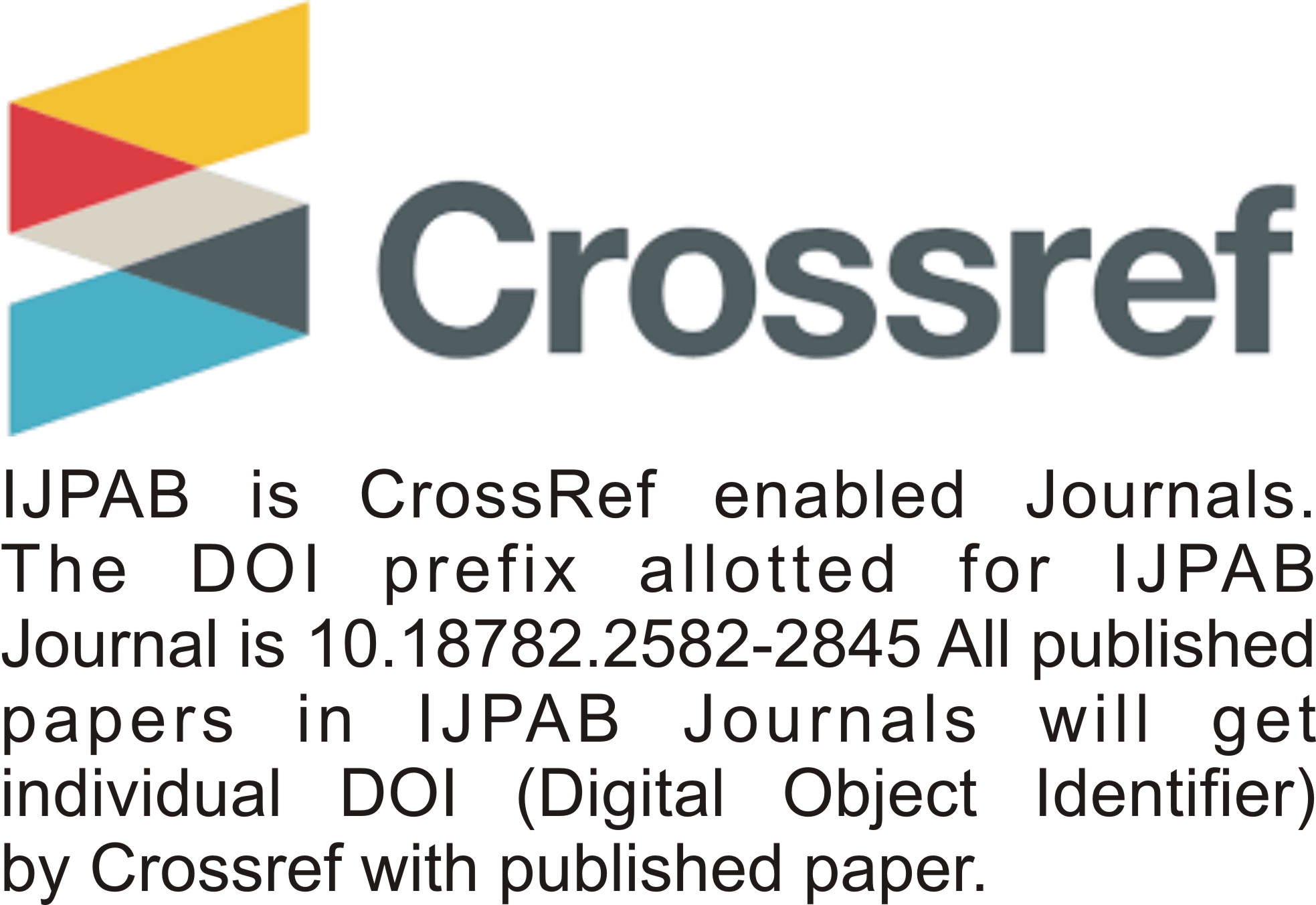
-
No. 772, Basant Vihar, Kota
Rajasthan-324009 India
-
Call Us On
+91 9784677044
-
Mail Us @
editor@ijpab.com
Indian Journal of Pure & Applied Biosciences (IJPAB)
Year : 2020, Volume : 8, Issue : 5
First page : (335) Last page : (338)
Article doi: : http://dx.doi.org/10.18782/2582-2845.8371
Impact of Knowledge on TN-IAMP Black Gram Growers in Madurai District of Tamil Nadu
Shameer Ahamed A.1, Ramakrishnan. K2* ![]() , and J. Pushpha3
, and J. Pushpha3
Dept. of Agrl. Extension & Rural Sociology, Agricultural College & Research Institute (TNAU)
Madurai-625 104 Tamil Nadu, India
*Corresponding Author E-mail: ramki.vnr@gmail.com
Received: 3.9.2020 | Revised: 8.10.2020 | Accepted: 15.10.2020
ABSTRACT
The World Bank Supported TN IAMP (Irrigated Agriculture Modernisation Project) is a follow up of IAMWARM (Irrigated Agriculture Modernisation and Water-Bodies Restoration and Management Project). Normally Western Ghats are receiving limited average annual rain fall of about 925 mm, lower than the national average 1200 mm. The project will adopt climate-resilient approaches that promotes sustainable use of land and water resources. This study was undertaken in the Madurai district of Tamil Nadu state during 2019. Totally 8 villages were selected from the study area. The respondents of 120 TN-IAMP black gram beneficiaries were selected using purposive sampling method. Knowledge is pre-requisite for adoption of an innovation. Crop production technology aspects reveals that (100 percent) of the beneficiaries possessed knowledge. With regard of grading and storage process (57-77 percent) of the beneficiaries were possessed knowledge. It might be observed that majority (81.70 per cent) of the TN-IAMP beneficiaries had medium level of knowledge.
Keywords: Knowledge, TN-IAMP, Beneficiaries & Recommended Practices.
Full Text : PDF; Journal doi : http://dx.doi.org/10.18782
Cite this article: Shameer A.A., Ramakrishnan, K., & Pushpha, J. (2020). Impact of Knowledge on TN-IAMP Black Gram Growers in Madurai District of Tamil Nadu, Ind. J. Pure App. Biosci. 8(5), 335-338. doi: http://dx.doi.org/10.18782/2582-2845.8371
INTRODUCTION
The World Bank Supported TN IAM (Irrigated Agriculture Modernisation) Project is a follow up of IAMWARM (Irrigated Agriculture Modernisation and Water-Bodies Restoration and Management) Project which has made significant development impacts in the state by modernising irrigation infrastructure, improving water use efficiency, enhancing yields and productivity of agriculture in a climate resilient production systems, diversification towards high value crops, strengthening the institutional reforms through Participatory Irrigation Management (PIM) and Water Users Association (WUA). Tamil Nadu is one of the water starved states in India endowed with only 3 percent of the water resources in India. The state located in the rain shadow region of the Western Ghats is receiving limited average annual rain fall of about 925 mm, lower than the national average 1200 mm.
The interventions of this component are aimed at increasing productivity of mostly key crops, promoting diversification of agriculture production systems, enhancing resilience and improving farmer access to markets in project sub-basins. The project will adopt climate-resilient approaches that promotes sustainable use of land and water resources.
The component consists of three sub-components,
- Agricultural intensification and diversification
- Improving alternative livelihood sources through livestock and inland aquaculture
- Marketing, value-addition and post-harvest management.
MATERIALS AND METHODS
This study was undertaken in the Madurai district of Tamil Nadu state. Madurai District of Tamil Nadu was purposively selected for this study because, TN-IAMP was implemented under Tamil Nadu Agricultural University. In this district, areas were covered under sirumalaiyar and sathaiyar sub-basin since its cover a more ayacut area. Madurai district consists of 7 taluks and among this taluks Alanganallur and Vadipatti blocks were selected for this study. Among these blocks totally 8 villages were selected based on TN-IAMP beneficiaries identified. The respondents of 120 TN-IAMP black gram beneficiaries were selected using purposive sampling method as follows.
Table 1: Distribution of the respondents in the selected villages (n=120)
S.No |
Village |
No. of respondents selected |
1. |
Thevaseri |
17 |
2. |
Muduvarpatti |
17 |
3. |
Sukkampatti |
8 |
4. |
Kutladampatti |
19 |
5. |
Semminipatti |
30 |
6. |
Katchaikatti |
6 |
7. |
Chokalingapuram |
9 |
8. |
poochampatti |
14 |
Total |
120 |
|
FINDINGS AND DISCUSSION
Knowledge on TN-IAMP black gram beneficiaries
Knowledge is pre-requisite for adoption of an innovation, as this enables the farmers to understand completely the recommended technologies, innovation and its attributes. The innovation, diffusion and communication of relevant technologies will have little effect unless farmers gain the knowledge about the technologies communicated and feel a need to put them into practice. Hence, it is necessary to analyse the knowledge level of respondents.
Practice- wise level of knowledge
Table 2: Distribution of respondents according to their practice wise extent of knowledge on black gram cultivation (n=120)
S.No |
Practices |
Knowledge level |
|
Number |
Percent |
||
I |
Crop production technologies |
||
1. |
Land should be free from volunteer plants like dry root rot |
74 |
61.60 |
2. |
Make the land to fine tilth condition |
99 |
82.50 |
3. |
Mid-July to mid-august and mid-January to mid-February is suitable season for black gram cultivation |
84 |
70.00 |
4. |
VBN 6 is variety used for black gram cultivation |
120 |
100.00 |
5. |
Duration of VBN 6 is 65-70 days |
120 |
100.00 |
6. |
20 kg/ha seed required for black gram cultivation |
102 |
85.00 |
7. |
45*10 cm is spacing followed for black gram cultivation |
72 |
60.00 |
II |
Crop protection technologies |
||
8. |
Sowing should be done in proper season |
93 |
77.50 |
9. |
Crop rotation should be done |
92 |
76.60 |
10. |
Fixation of light traps to attract gram pod borer adult stage |
95 |
79.10 |
11. |
Removal of yellow mosaic virus affected plants from the field to control viral diseases |
66 |
55.00 |
12. |
Seed treatment with tricoderma viride @ 4g/kg or pseudomonas fluroscenes @ 10g/kg of seeds to control dry root rot |
72 |
60.00 |
13. |
Fix the pheromone trap @ 12no/ha to control borer |
60 |
50.00 |
14. |
Spraying of carbendazim @ 2.5 kg/ha on plant parts to control powdery mildew disease in black gram |
75 |
62.50 |
III. |
Harvest and storage |
||
15. |
Pods turns brown or black with hard seeds inside pods are harvesting indices for black gram |
96 |
80.00 |
16. |
Plants are uprooted by hand or cut with sickle at the bottom of the plants |
93 |
77.50 |
17. |
Beating with flexible bamboo stick or by machinery to separation of seeds from harvested plants |
93 |
77.50 |
18. |
Drying of seeds by open sun dry up to 8-9 % of moisture content in seeds |
84 |
70.00 |
19. |
Discoloured and broken seeds should be eliminated before grading |
78 |
65.00 |
20. |
Store the seeds in gunny bags or cloth bags for short term storage (8-9 months) with seed moisture of 8-9% |
69 |
57.50 |
Knowledge on crop production technologies
It could be observed from above Table.2. According to crop production technology aspects reveals that (100 percent) of the beneficiaries possessed knowledge in using VBN 6 variety for cultivation and duration of crop be 65-70 days. And maximum number of beneficiaries (85.00 percent) had knowledge on using recommended seed rate of cultivation.
Averagely (70-85 percent) of beneficiaries possess knowledge on land preparation, maintaining recommended season, recommended spacing on crop production aspects.
Knowledge on crop protection technologies
It could be observed from above Table 2. Regarding crop protection measures beneficiaries are good in knowledge level, whereas majority (70-80 percent) of the beneficiaries were possess knowledge on (cultural control) fixation of light traps, crop rotation and sowing carry out in proper season.
With regard to equal distribution (60-75 percent) of beneficiaries possessed knowledge on biological and chemical control of pest & diseases.
Knowledge on harvest and storage
It could be observed from the Table 2. Majority of the beneficiaries (70-80 percent) were possess knowledge on harvest indices (colour turns brown to black), harvesting methods (hand removal / by sickle) and processing (separation of seeds and drying).
With regard of grading and storage process (57-77 percent) of the beneficiaries were possess knowledge on proper grading of seeds (elimination of broken and discoloured seeds) and storage (with gunny bags).
Overall knowledge level of TN-IAMP beneficiaries
To access the overall knowledge level of the TN-IAMP beneficiaries on black gram cultivation, the necessary data were collected, analysed and the findings are furnished in the below Table 3. The beneficiaries were categorized as low, medium and high knowledge level categories.
Table: 3 Distribution of the respondents according to their overall knowledge of TN-IAMP
beneficiaries (n=120)
S.No |
Category |
Number |
Percent |
1. |
Low |
20 |
16.60 |
2. |
Medium |
98 |
81.70 |
3. |
High |
2 |
1.70 |
|
Total |
120 |
100.00 |
It might be seen from above table that majority (81.70 percent) of the TN-IAMP beneficiaries were had medium level of knowledge and followed by nearly meagre percent of beneficiaries had low (16.60 percent) and high (1.70 percent) of knowledge.
CONCLUSION
From the above findings, majority of TN-IAMP beneficiaries (98.30 percent) were categorised under low to medium level of knowledge on recommended practices, because of most of beneficiaries were functionally literate to middle school level, medium level of social participation, information seeking behaviour and innovativeness. In future, beneficiaries might to follow TN-IAMP for another five years or more which leads to good result in knowledge and increasing the rate of adoption rate on future on this technologies.
REFERENCES
Sindhuja, P., & Shanthasheela, M. (2017). Profile of Precision Farming Vegetable Beneficiaries in Ongur Sub-Basin Under TN-IAMWARM project, International Journal of Research in Agriculture and Forestry, 4(2), P: 10-15.
Ravichandran, V. K., & Prakash, K. C. (2015). Socio-Economic Impact of SRI and Traditional Rice Cultivation in Villupuram District of Tamil Nadu: Experiences from TN-IAMWARM Project, International Journal of Agricultural Sciences, 11(1), PP. 166-171.
Palanisamy, A. (2011). Impact Of TN-IAMWARM Project on the Farm and Home of Precision Farming Beneficiaries- An Analysis, M.Sc (Agri) Thesis, Department of Agricultural Extension and Rural Sociology, TNAU, Coimbatore.
Sangeetha, S. (2009). Study on Factors Influencing the Adoption of Precision Farming Technologies in Tomato Cultivation. Unpub. M.Sc. (Ag.) Thesis, AC&RI, TNAU, Coimbatore.
Sudha, T. (2008). Prospects of precision farming in Dharmapuri district – A multidimensional analysis, Unpub. M.Sc. (Ag.) Thesis, AC&RI, TNAU, Madurai.

